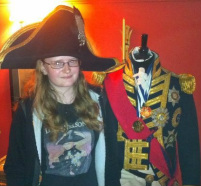
Pierre-Charles-Jean-Baptiste-Silvestre de Villeneuve (whose name was not long at all!) was the Commander-in-Chief of the Combined French and Spanish fleet at Trafalgar.
He was born 31 December 1763, in Valensole, Alpes-de-Haute-Provence, France and was from an aristocratic background. He joined the French Navy in 1778 and took part in the American Revolutionary War. He was sympathetic towards the French revolutionaries and dropped the aristorcratic 'de' from his name, which probably saved him from the guillotine and allowed him to continue his service in the navy. He experienced many battles and was promoted to Rear Admiral in 1796.
In 1798, he witnessed the devastation of the French fleet at the Battle of the Nile, which he would never forget. His was one of only two ships to escape, earning him a lot of criticism for not engaging the enemy. He was captured not long after but was soon released.
By 1804 Villeneuve had been promoted to Vice-Admiral and was stationed in Toulon. Napoleon ordered him to break the British blockade (commanded by Nelson) and draw them away to the West Indies, before quickly returning to destroy the Channel Fleet, enabling Napoleon to take his invasion barges across to England and invade (see Trafalgar Campaign post).
When he did finally escape, things started to go very wrong, and after being chased by Nelson to and from the West Indies, he joined with the Spanish Fleet and disobeyed his orders and sailed into the Port of Cadiz- putting an end to Napoloen's plans of invasion (no surprise then that Napoleon took such a disliking to him). After a few weeks, his fleet emerged only to be severely beaten by the British at Trafalgar.
He has been treated harshly by historians often been regarded as being cowardly. But is this really fair?
We know he was terrified of Nelson, and kept in port to avoid fighting him, afraid of a re-run of the Battle of the Nile. He knew what Nelson could do, and he knew he would lose.
However, it must be remembered that during the Trafalgar Campaign Villenueve was in a very difficult position. Napoleon was breathing down his neck and he was not the type of person you want to make angry! But Napoleon had no knowledge of the sea. It took months before Villeneuve successfully broke out of Nelson's blockade, and his was the only fleet that managed it, as other blockades were very tight. But Napoleon was outraged at the lack of action, failing to understand that Villenueve and the other admirals could not simply break the blockade without a battle first.
To add to his problems was the fact that the Combined Fleet was, let's say, not at its best! Keeping in port took its toll on their ships, which were now in bad condition and filled with disease. The men were unpractised and morale was very low. Villeneuve knew that they wouldn't stand a chance against the British fleet.
But, as mentioned before, Napoleon was not one to anger, and Villeneuve was reprimmanded and informed that he was to be replaced. His honour was hanging in the balance. He had one last chance to prove himself. He thought of the thin hope of him winning against Nelson and attempted to come up with a counter plan, having already accurately guessed what Nelson would break the line. But in the end he failed to actually formulate one.
To add to all of this, the relationship between the two fleets under his command was incredibly strained. When he called a Council of War on his flagship the Bucentaure, there was nearly a duel between two officers and Villeneuve and Gravina, the Spanish Admiral, argued about whether to put to sea or not. Villenueve wanted to sail as soon as possible, and Gravina was concerned about the westerly winds which would make putting to sea almost impossibe, saying, 'Do you not see sir, that the barometer is falling?' To which Villeneuve scathingly replied, 'It is not the glass, but the courage of certain persons that is falling'. Eventually, they decided to sail to the mouth of the harbour and then wait for the weather to pass.
He sailed his fleet out of Cadiz on 19th October, before his replacement could arrive. He told his officers to rely on their 'love of glory'.
He as been criticised for sailing his fleet to it's doom, but it was a rather lose-lose situation for Villenueve, and his prospects were rather grim either way.
He was born 31 December 1763, in Valensole, Alpes-de-Haute-Provence, France and was from an aristocratic background. He joined the French Navy in 1778 and took part in the American Revolutionary War. He was sympathetic towards the French revolutionaries and dropped the aristorcratic 'de' from his name, which probably saved him from the guillotine and allowed him to continue his service in the navy. He experienced many battles and was promoted to Rear Admiral in 1796.
In 1798, he witnessed the devastation of the French fleet at the Battle of the Nile, which he would never forget. His was one of only two ships to escape, earning him a lot of criticism for not engaging the enemy. He was captured not long after but was soon released.
By 1804 Villeneuve had been promoted to Vice-Admiral and was stationed in Toulon. Napoleon ordered him to break the British blockade (commanded by Nelson) and draw them away to the West Indies, before quickly returning to destroy the Channel Fleet, enabling Napoleon to take his invasion barges across to England and invade (see Trafalgar Campaign post).
When he did finally escape, things started to go very wrong, and after being chased by Nelson to and from the West Indies, he joined with the Spanish Fleet and disobeyed his orders and sailed into the Port of Cadiz- putting an end to Napoloen's plans of invasion (no surprise then that Napoleon took such a disliking to him). After a few weeks, his fleet emerged only to be severely beaten by the British at Trafalgar.
He has been treated harshly by historians often been regarded as being cowardly. But is this really fair?
We know he was terrified of Nelson, and kept in port to avoid fighting him, afraid of a re-run of the Battle of the Nile. He knew what Nelson could do, and he knew he would lose.
However, it must be remembered that during the Trafalgar Campaign Villenueve was in a very difficult position. Napoleon was breathing down his neck and he was not the type of person you want to make angry! But Napoleon had no knowledge of the sea. It took months before Villeneuve successfully broke out of Nelson's blockade, and his was the only fleet that managed it, as other blockades were very tight. But Napoleon was outraged at the lack of action, failing to understand that Villenueve and the other admirals could not simply break the blockade without a battle first.
To add to his problems was the fact that the Combined Fleet was, let's say, not at its best! Keeping in port took its toll on their ships, which were now in bad condition and filled with disease. The men were unpractised and morale was very low. Villeneuve knew that they wouldn't stand a chance against the British fleet.
But, as mentioned before, Napoleon was not one to anger, and Villeneuve was reprimmanded and informed that he was to be replaced. His honour was hanging in the balance. He had one last chance to prove himself. He thought of the thin hope of him winning against Nelson and attempted to come up with a counter plan, having already accurately guessed what Nelson would break the line. But in the end he failed to actually formulate one.
To add to all of this, the relationship between the two fleets under his command was incredibly strained. When he called a Council of War on his flagship the Bucentaure, there was nearly a duel between two officers and Villeneuve and Gravina, the Spanish Admiral, argued about whether to put to sea or not. Villenueve wanted to sail as soon as possible, and Gravina was concerned about the westerly winds which would make putting to sea almost impossibe, saying, 'Do you not see sir, that the barometer is falling?' To which Villeneuve scathingly replied, 'It is not the glass, but the courage of certain persons that is falling'. Eventually, they decided to sail to the mouth of the harbour and then wait for the weather to pass.
He sailed his fleet out of Cadiz on 19th October, before his replacement could arrive. He told his officers to rely on their 'love of glory'.
He as been criticised for sailing his fleet to it's doom, but it was a rather lose-lose situation for Villenueve, and his prospects were rather grim either way.
So, despite what Napoleon thought of him, it seems to me that Villenueve, while always a 'sensible' admiral (not something Nelson would have admired at all!), he was not cowardly- quite the opposite. He faced Nelson- the scariest thing at sea if you were an enemy of Britain- despite knowing he would lose. It takes quite a lot of guts to do that. In fact, when he was captured, the British were amazed by the way he calmly accepted his fate. I think Villeneuve deserves respect for that at least.
Unfortunately, it didn't end well for Villeneuve. He was sent to England as a prisoner of war, but was released on parole. He even attended Nelson's funeral. Not long after he was free to return to France, but was found dead only a few days later on 22nd April. He was discovered allegedly with six stab wounds to the left lung and heart, and it was reported as suicide. However, many people believed that he had been assassinated by Napoleon's men
Unfortunately, it didn't end well for Villeneuve. He was sent to England as a prisoner of war, but was released on parole. He even attended Nelson's funeral. Not long after he was free to return to France, but was found dead only a few days later on 22nd April. He was discovered allegedly with six stab wounds to the left lung and heart, and it was reported as suicide. However, many people believed that he had been assassinated by Napoleon's men

 RSS Feed
RSS Feed